新视野英语教程教案
- 格式:doc
- 大小:100.00 KB
- 文档页数:11
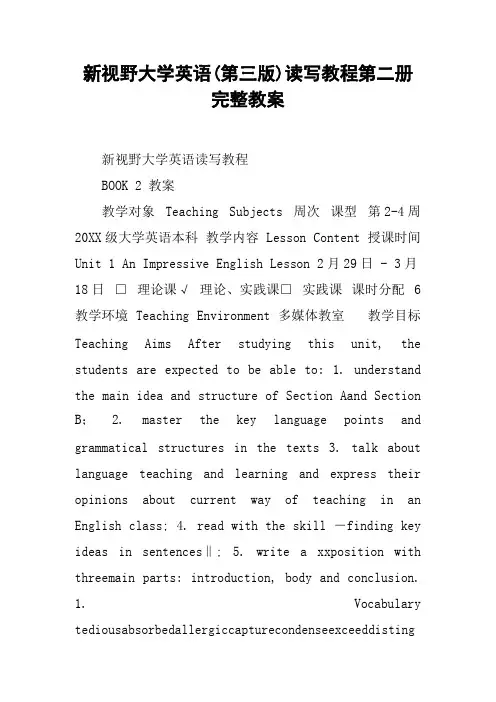
新视野大学英语(第三版)读写教程第二册完整教案 新视野大学英语读写教程 BOOK 2 教案 教学对象Teaching Subjects 周次课型第2-4周20XX级大学英语本科教学内容 Lesson Content 授课时间Unit 1 An Impressive English Lesson 2月29日 - 3月18日□理论课√理论、实践课□实践课课时分配 6 教学环境 Teaching Environment 多媒体教室教学目标Teaching Aims After studying this unit, the students are expected to be able to: 1. understand the main idea and structure of Section Aand Section B; 2. master the key language points and grammatical structures in the texts 3. talk about language teaching and learning and express their opinions about current way of teaching in an English class; 4. read with the skill ―finding key ideas in sentences‖; 5. write a xxposition with threemain parts: introduction, body and conclusion.1. Vocabulary tediousabsorbedallergiccapturecondenseexceeddistinguishdistinctivexxplimentaryxxplementaryproclaimevid entlyadequatexxpetentadjustbeneficial 2. Skills ● Learn to read with the skill ―finding key ideasin sentences‖and write a xxposition with threemain parts: introduction, body and conclusion. ●To talk about language teaching and learning ●write a xxposition with threemain parts: introduction, body and conclusion. ●To apply the phrases and patterns 重点Key Issues 难点PotentialProblems and Difficulties 教学方法Methodology A xxbination of traditional teaching methods with the xxmunicative approach will be adopted. Special attention should be paid to classroom interaction like questioning and answers. Small group works are always needed while discussing the questions and the difficult translation encouragement is needed and more guidance will be given in their extracurricular study. Visual aids, projector, stereo and microphone 教具Teaching Aids 教学分组Teaching Groups Group work and pair work 课堂学习任务与活动的组织Conduct of Tasks and Activities Students-centered Task-based teaching and learning 教学过程设计Teaching Procedures 步骤1Step 1 导入Lead-in warming-up questions discussion. 1. What are the key factors that help people learn English as a foreign language 2. Do you have any problem in English learning you think grammar is important in English learning II. Listening and discussing. 1. Listening practice. 2. In your opinion, what is the most effective way to learn English III. Listening to a talk and answer questions on page 2 步骤 2Step2课文学习Section A An Impressive English Lesson I. New words 1. tedious: a. boring and continuing for too long 冗长乏味的Telling the story has bexxe tedious, as I have done it so many times. 讲述这个故事已变得单调乏味,因为我已经讲了这么多次了。
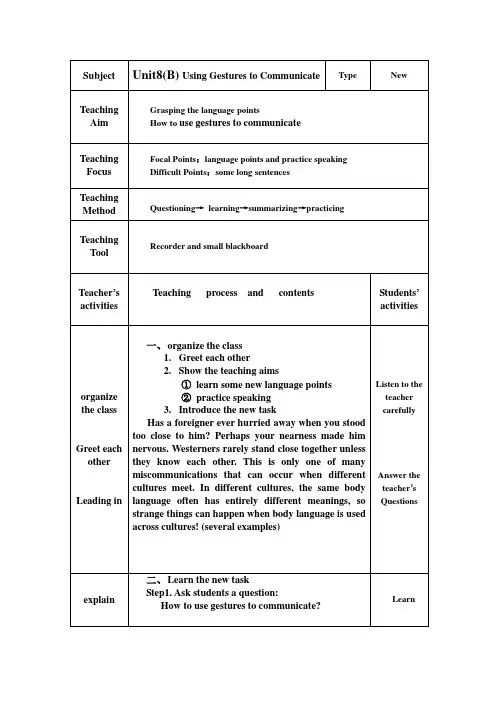
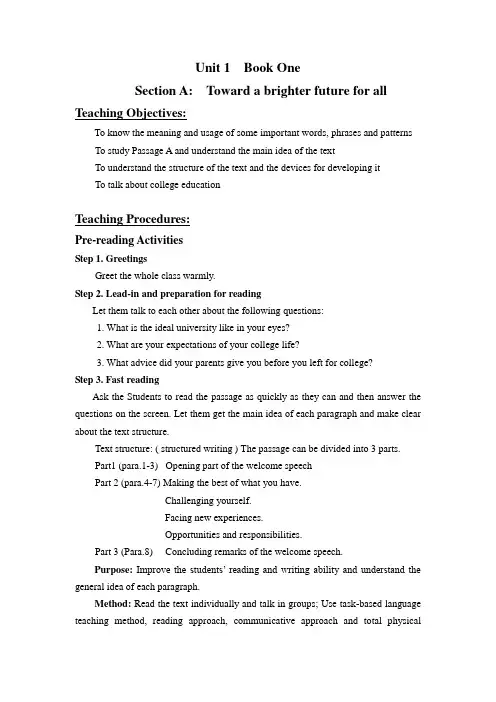
Unit 1 Book OneSection A: Toward a brighter future for all Teaching Objectives:To know the meaning and usage of some important words, phrases and patterns To study Passage A and understand the main idea of the textTo understand the structure of the text and the devices for developing itTo talk about college educationTeaching Procedures:Pre-reading ActivitiesStep 1. GreetingsGreet the whole class warmly.Step 2. Lead-in and preparation for readingLet them talk to each other about the following questions:1. What is the ideal university like in your eyes?2. What are your expectations of your college life?3. What advice did your parents give you before you left for college?Step 3. Fast readingAsk the Students to read the passage as quickly as they can and then answer the questions on the screen. Let them get the main idea of each paragraph and make clear about the text structure.Text structure: ( structured writing ) The passage can be divided into 3 parts.Part1 (para.1-3) Opening part of the welcome speechPart 2 (para.4-7) Making the best of what you have.Challenging yourself.Facing new experiences.Opportunities and responsibilities.Part 3 (Para.8) Concluding remarks of the welcome speech.Purpose: Improve the students’ reading and writing ability and understand the general idea of each paragraph.Method: Read the text individually and talk in groups; Use task-based language teaching method, reading approach, communicative approach and total physicalresponse method.Step 4. Preparation for details of the text on the screenStudents are required to look at the Words and Phrases on the screen and give a brief presentation in class.Words and Phrases:Purpose: Train the Students’ ability of unde rstanding and using foreign language.Method:Talk in groups, Use task-based language teaching method, communicative approach and total physical response method.1. (Para.1)pledge to do sth. 作保证,承诺China and the United states pledge to boost cooperation and exchange to ensure a better future for China-US ties.中美政府承诺将加强合作与交流以确保两国关系的未来更加美好。
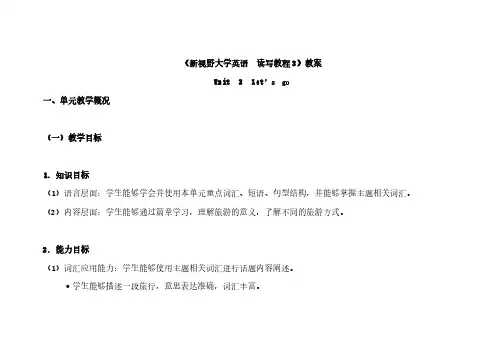
《新视野大学英语读写教程3》教案Unit 3 Let’s go一、单元教学概况(一)教学目标1. 知识目标(1)语言层面:学生能够学会并使用本单元重点词汇、短语、句型结构,并能够掌握主题相关词汇。
(2)内容层面:学生能够通过篇章学习,理解旅游的意义,了解不同的旅游方式。
2. 能力目标(1)词汇应用能力:学生能够使用主题相关词汇进行话题内容阐述。
• 学生能够描述一段旅行,意思表达准确,词汇丰富。
• 学生能够就旅行相关话题表达观点,同时能够就旅行话题相关观点进行分析评价。
(2)阅读能力:学生能够分析文章结构,了解不同的写作文体,并识别文章的写作风格。
(3)写作能力:学生能够准确进行因果关系论述,论点论据清晰,逻辑性强,并使用准确、丰富的标记词汇。
(4)应用能力:学生能够根据目的地制定多日旅行计划,学会制定日程表,内容全面。
(5)思辨能力:学生能够分析旅游的意义与可能遇到的挑战;能够比较、分析独自旅游的优劣势3.思政育人目标学生能够运用主题相关词汇介绍进入联合国世界文化遗产和自然遗产名录的中国景点,介绍自己家乡景点,培养学生家国情怀。
(二)教学基本内容本单元聚焦“旅行”主题,围绕三篇“旅行”主题相关的阅读素材,进行相关内容、词汇、技能等层面的学习,并在单元最后,应用单元所学,完成一个综合型产出任务。
本单元三篇学习素材各有侧重,旨在从不同维度加深学生对于旅游意义的思考:Text A阐释了旅行的意义,Text B描述了单独旅行的意义, Text C则介绍了一对老年夫妇在退休之后的旅行经历。
1. 词汇(1)重点词汇:ambiguity, cluster, compulsory, contemplate, drawback, globalization, groan, loosen, offset , stubborn, annoyance, cognitive, , trivial, be open to, endow...with, make up for, mi ngle with, more often than not, on sale, settle for, trade...for(2)主题相关词汇:Types of travel: trip, journey, voyage, ...Destinations: resorts, nature reserve, ...Describing a trip: adventurous, exciting, ... // tiring, exhausting, ...UNESCO world heritage sites in China: the Great Wall, the Forbidden City, ... Transportation and accommodation: HSR, metro, tram…;motel, hostel …2.技能• 阅读技能:梳理篇章结构、常用文体类型,并通过对比分析Text A和Text B写作特点,了解非正式语域的特点。
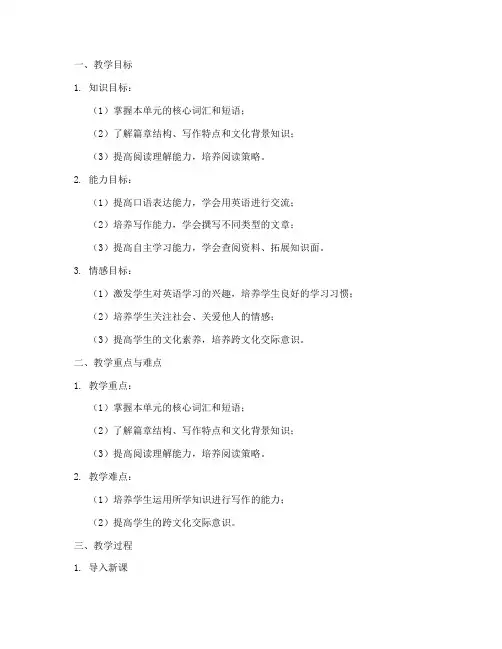
一、教学目标1. 知识目标:(1)掌握本单元的核心词汇和短语;(2)了解篇章结构、写作特点和文化背景知识;(3)提高阅读理解能力,培养阅读策略。
2. 能力目标:(1)提高口语表达能力,学会用英语进行交流;(2)培养写作能力,学会撰写不同类型的文章;(3)提高自主学习能力,学会查阅资料、拓展知识面。
3. 情感目标:(1)激发学生对英语学习的兴趣,培养学生良好的学习习惯;(2)培养学生关注社会、关爱他人的情感;(3)提高学生的文化素养,培养跨文化交际意识。
二、教学重点与难点1. 教学重点:(1)掌握本单元的核心词汇和短语;(2)了解篇章结构、写作特点和文化背景知识;(3)提高阅读理解能力,培养阅读策略。
2. 教学难点:(1)培养学生运用所学知识进行写作的能力;(2)提高学生的跨文化交际意识。
三、教学过程1. 导入新课(1)播放与本单元主题相关的视频或图片,激发学生的学习兴趣;(2)引导学生讨论与本单元主题相关的问题,如:“你认为什么是真正的友谊?”等。
2. 阅读理解(1)让学生快速阅读课文,了解文章大意;(2)引导学生分析文章结构,归纳段落大意;(3)针对课文内容,设置问题,让学生进行思考、讨论;(4)总结课文,加深学生对文章的理解。
3. 词汇学习(1)讲解本单元的核心词汇和短语,让学生掌握其用法;(2)设置词汇练习,巩固所学知识;(3)引导学生运用所学词汇进行口语和写作练习。
4. 写作指导(1)分析本单元的写作特点,如:议论文、说明文等;(2)指导学生进行写作,如:如何提出观点、如何组织论据等;(3)让学生进行写作练习,教师批改并给予反馈。
5. 课堂小结(1)回顾本节课所学内容,强调重点和难点;(2)布置课后作业,巩固所学知识。
四、教学评价1. 课堂表现:观察学生在课堂上的参与度、互动性等;2. 作业完成情况:检查学生的课后作业,了解学生对知识的掌握程度;3. 写作能力:通过写作练习,评估学生的写作水平;4. 口语表达能力:通过课堂讨论、角色扮演等方式,评估学生的口语表达能力。
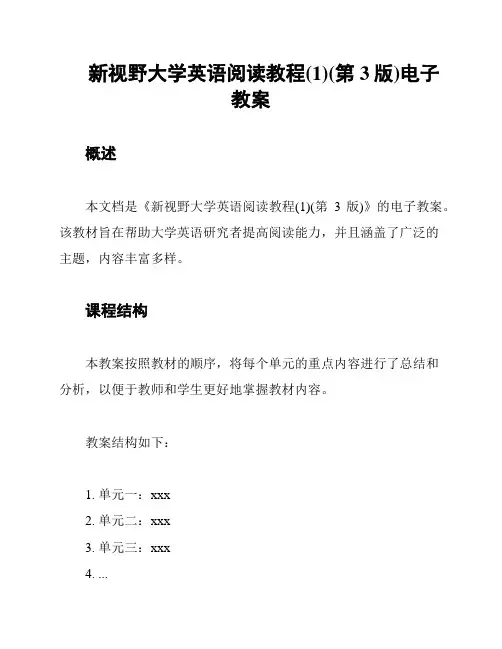
新视野大学英语阅读教程(1)(第3版)电子
教案
概述
本文档是《新视野大学英语阅读教程(1)(第3版)》的电子教案。
该教材旨在帮助大学英语研究者提高阅读能力,并且涵盖了广泛的
主题,内容丰富多样。
课程结构
本教案按照教材的顺序,将每个单元的重点内容进行了总结和
分析,以便于教师和学生更好地掌握教材内容。
教案结构如下:
1. 单元一:xxx
2. 单元二:xxx
3. 单元三:xxx
4. ...
教案特点
1. 简洁明了:教案主要围绕教材的核心内容,精心设计,以帮助学生高效研究。
2. 重点突出:教案对每个单元的重点内容进行了深入分析和解读,帮助学生理解主题和细节。
3. 练提供:教案中提供了相关的练题目,帮助学生巩固所学知识。
使用方法
教师可以根据教案的内容,结合教材中的教学资源,有针对性地进行教学。
学生可以参考教案中的分析和练,加深对教材内容的理解和掌握。
注意事项
1. 教案只是一种辅助工具,教师需要根据实际情况进行灵活运用。
2. 教案中提供的练题目可以作为学生自我评估和巩固复的资料,但并不是教学的全部内容。
以上是《新视野大学英语阅读教程(1)(第3版)电子教案》的简
要信息,请教师和学生根据实际需要进行使用。
如有任何疑问或需
进一步了解,请参阅教材原文。
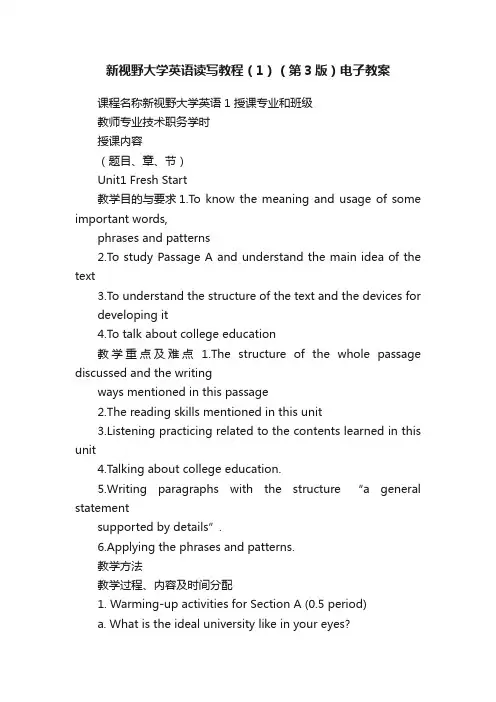
新视野大学英语读写教程(1)(第3版)电子教案课程名称新视野大学英语1 授课专业和班级教师专业技术职务学时授课内容(题目、章、节)Unit1 Fresh Start教学目的与要求1.T o know the meaning and usage of some important words,phrases and patterns2.To study Passage A and understand the main idea of the text3.To understand the structure of the text and the devices fordeveloping it4.To talk about college education教学重点及难点 1.The structure of the whole passage discussed and the writingways mentioned in this passage2.The reading skills mentioned in this unit3.Listening practicing related to the contents learned in this unit4.Talking about college education.5.Writing paragraphs with the structure “a general statementsupported by details”.6.Applying the phrases and patterns.教学方法教学过程、内容及时间分配1. Warming-up activities for Section A (0.5 period)a. What is the ideal university like in your eyes?b. What are your expectations of your college life?c. Listen to an interview about tips for freshman students and do the following exercise.d. Listen to a short passage concerning college education and fill in the missing information.2. Text study for Section A (3.5 periods)a. Main idea of the partsIn his welcome speech, the president urges students to take advantage of the uniqueopportunity to face new exciting experience and to challenge themselves so that they will reap the benefits of their college years. The president also expresses the university’s expectations of its students and of the responsibilities they carry.Part I (Para. 1-3): The president congratulates students on their achievement and reminds students of the fact that their current success was due to their own and their parents’ efforts, and that their future is built on a solid foundation of the past.Part II (Para. 4-7): The president offers students comprehensive advice on how to make the most of their four college years and makes them realize the university’s expectations and their own responsibilities.Part III (Para. 8): The students are called upon to cherish the opportunity and to bear in mind their responsibilities as citizens of their communities, their country and the world.b. Structure of the textOpening part of the welcome speechAdviceConcluding partc. Summary of the textLanguage focusPledge to do sth. : China and the United states pledge to boost cooperation and exchange to ensure a better future for China-US ties.Make the most of sth.: This article introduces 7 tips for making the most of your iPhone5S.Reap the benefits: Keep on reading extensively, and you will reap the benefits sooner or later.Feel overwhelmed by sth.: Nowadays, many young people feel overwhelmed by the fierce competition in the job market.Stand chance of: Animals stand little chance of survival under such extreme weather. Take great pleasure in: He always takes great pleasure in lending a helping hand topeople around him.Open the door to sth.: These useful suggestions open the door to better communication with your parents.3. Language applicationa. writing deviceSentence writingParallelism:By placing two or more ideas of equal value in the same grammatical form enables us to express these ideas clearly and emphatically.Example: You may have cried tears of joy to be finally finished with high school; your parents may have cried tears of joy to be finally finished with doing your laundry!Paragraph writing: topic - details - conclusionExample:For you, these next four years will be a time unlike any other. (Topic sentence) Here you are surrounded by great resources: interesting students from all over the country, a learned andcaring faculty, a comprehensive library, great sports facilities, and student organizations covering every possible interest from the arts to science, to community service and so on. (Detail 1: What is available to you on campus) You will have the freedom to explore and learn about new subjects. You will learn to get by on very little sleep, meet fascinating people, and pursue new passions. (Detail 2: What you can do) I want to encourage you to make the most of this unique experience, and to use your energy and enthusiasm to reap the benefits of this opportunity. (Concluding sentence)Activities performed in class:Do you think a university education can change a person’s life? In what way and why?How do you think of those successful people such as Bill Gates who dropped out of university?What are you going to do at university in order to sample widely and challenge yourself?Section B (1 period)学生书面作业及课后要求1.Review the key points of Section A;2.Finish the exercises after class;3.Finish online homework;4.Preview Section B.5.Writing Topic: Suppose, as an freshman, you are expected to give a speechto your teachers and classmate.You can follow the outline given below.Part I Opening part of the speech1.Your gratitude to your teachers and parents;2.Your feelings and impressions about the university;3.Your expectation of the future.Part II Your understanding of the university1.School motto and your interpretation;2.Campus facility, e.g. the library, and learning atmosphere;3.Courses and other social activities;4.Teachers and classmates.Part III Conclusion1.Opportunities and challenges;2.Your plans and determination for the future.教研组审阅意见(组长签名)年月日教学小结课程名称新视野大学英语1 授课专业和班级教师专业技术职务学时授课内容(题目、章、节)Unit 2 Loving parents, loving children教学目的与要求1.T o talk about the love between the parents and children2.To understand the love between the mother and the daughter inthe text3.To apply the phrases and patterns4.To write an essay creatively based on the understanding of thetext教学重点及难点 1.The structure of the whole passage discussed and the writingways mentioned in this passage2.The reading skills mentioned in this unit3.Listening practicing related to the contents learned in this unit4.Talking about parents-children relationship.5.Writing paragraphs with the “problem-solution pattern”.6.Applying the phrases and patterns.教学方法教学过程、内容及时间分配1.Warming-up activities for Section A (0.5 period)Let them have a surveySurvey: How close are you and your parents?Check (√) the statements which are true for you.I have been missing my parents a lot since I left for college.I often chat with my parents.I like sharing my joys and sorrows with my parents.I always remember my parents’ birthdays.I know about my parents’ hobbies.My parents allow me to make my own decisions.Ask a question: To what extent are you close to your parents?be like friends;never keep secret from them;ask them for advice;give me directions about life …2.Text study for Section A (3.5 periods)Ask the Students to read the passage as quickly as they can and then answer the questions on the screen. Let them get the main idea of each paragraph and make clear about the text structure.Text structure: ( structured writing ) The passage can be divided into 3 parts.Part1 (para.1-4) Opening part of the welcome speech General situation & my responses.Part 2 (para.5-12) The mess left in my daughter’s bath room and my responses.Part 3 (Para.13-22) Concluding part: The changes of my attitude.Purpose: Improve the students’ reading and writing ability and understand the general idea of each paragraph.Method: Read the text individually and talk in groups; Use task-based language teaching method, reading approach, communicative approach and total physical response method.Preparation for details of the text on the screenStudents are required to look at the Words and Phrases on the screen and give a brief presentation in class.Words and Phrases:Purpose: Train the Students’ ability of understanding and using foreign language. Method: Talk in groups, Use task-based language teaching method, communicative approach and total physical response method.1. (Para.1) make it. 成功;准时到达With blood pouring from his leg, he made it to a nearby house.他腿上流着血,支撑着走到附近的一所房子。
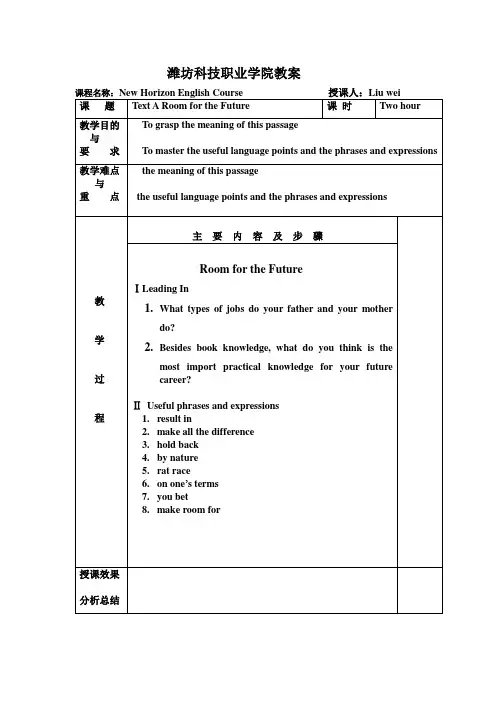
潍坊科技职业学院教案Room for the FutureⅠLeading In1. What types of jobs do your father and your mother do?2. Besides book knowledge, what do you think is the most importpractical knowledge for your future career?II Key points1. Room for the FutureMeaning: possibility or scope for one's future development2. After twenty-two years of working for a major bank, a downsizing wave resulted in the elimination of over one hundred jobs, mine being one of them.Meaning:Having worked for a big bank for twenty-two years, I lost my job, together with more than one hundred of my colleagues because the bank wanted to reduce the number of its employees.3. My once secure future now seemed insecure.Meaning: I had always thought my future was safe, but it seemed unsafe now.Please notice "secure" and "insecure" are a pair of antonyms(反义词).secure:adj. a situation that is secure is one that you can depend on because it is not likely to change 稳固的;可靠的;稳定的Estate in this city is a secure investment.在这座城市,地产是可靠的投资。
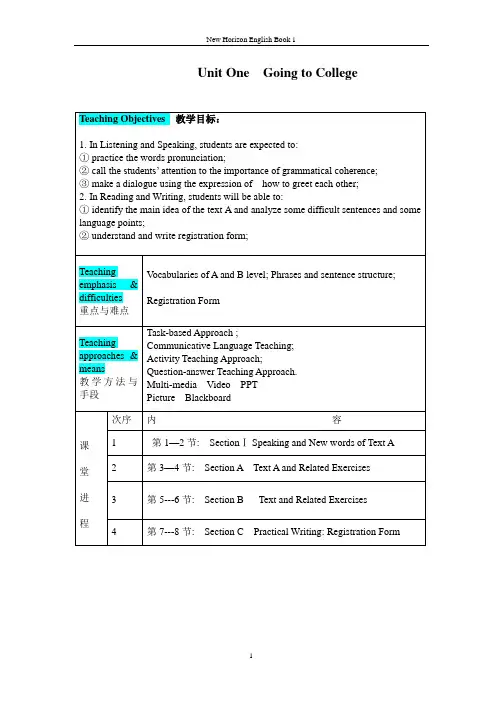
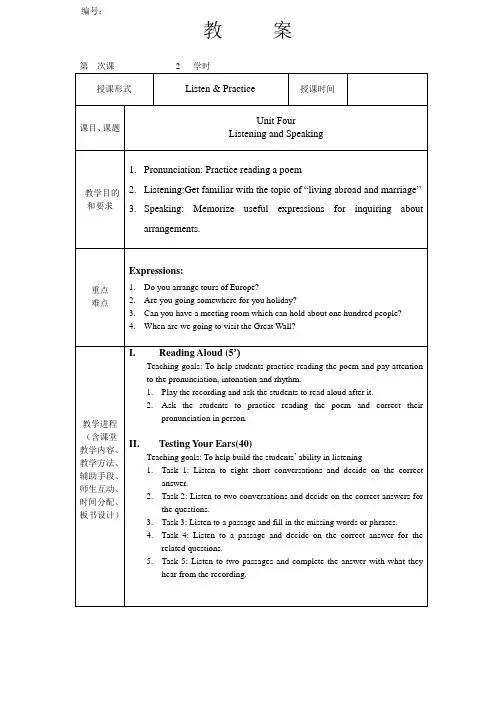
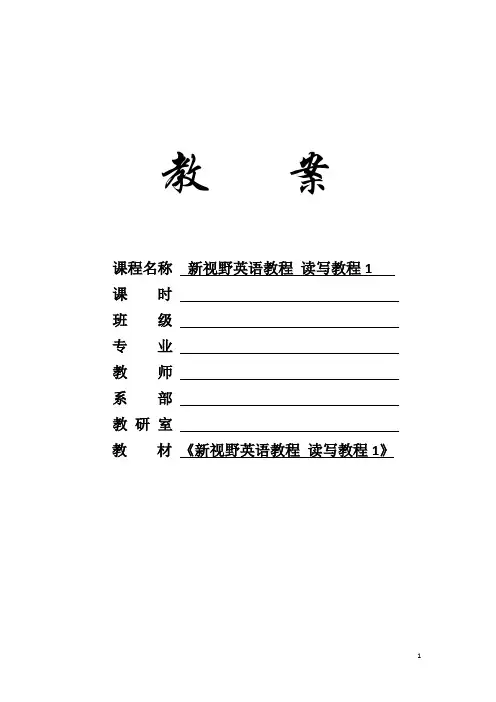
大学英语三(读写)教案10)ingenious a.good at inventing things and solving problems in new ways (人)有独创性的They are attacking the honest and ingenious scientist because his ideas are new.他们攻击这位诚实并富有独创能力的科学家, 是因为他的观点新颖。
2 .While-reading ActivitiesStep 4.Intensive readingStudents are asked to read the passage carefully again and answer some detailed questions on the screen.During the reading, there is an explanation for the following points:Language Points:1.That year every guy on campus had a leather jacket, and Rob couldn’t stand the idea of being the onlyfootball player who didn’t, so he made a pact that he’d give me his girl in exchange for my jacket.(Para.1)Meaning: That year every young man in the college wore a leather jacket.Rob was the only one in the football team who didn’t have one.He felt frustrated whenever he thought about it, so he made an agreement with me that if I gave him my leather jacket, he would, as an exchange, give me his girlfriend.2.make a pact: 达成协议in exchange for: 作为(对...的)交换3.If I could show the elite law firms I applied to that I had a radiant, well-spoken counterpart by my side, Ijust might edge past the competition.(Para.2)Meaning: When looking for a job, if I could show the top law companies that I had a partner who was not only beautiful but also intelligent and polite, I might well be able to gain an advantage over mycompetitors and successfully get a job offer.3. “Radiant”she was already.I could dispense her enough pearls of wisdom to make her “well-spoken”.(Para.3)Meaning: She was already very beautiful.And I could teach her to speak intelligently so that she would sound very pleasant and smart when she speaks.Meaning beyond words: The word “dispense”, which means “give sth.to people”, shows that the narratorregards himself far superior to the girl.He is again boasting and praising himself.The word shows hisarrogance and conceit.4.After a banner day out, I drove until we were situated under a big old oak tree on a hill off the expressway.(Para.4)Meaning: After spending an excellent day out with her, I drove my car to a hill by the highway.I stopped when we were under a big old oak tree.5.banner a.极好的;非常成功的n.横幅;横幅标语She seemed to have a good time.I could safely say my plan was underway.I took her home and set a date for another conversation.(Para.15)Meaning: It seemed that she had enjoyed my logic lesson very much.I was pretty sure that my plan was going on smoothly.I drove her home and decided on a date for our next meeting.underway 在进行中set a date for 为.....定日期 e.g.They will set a date for the wedding.6. “The situations are altogether different.You can’t make an analogy between them”.(Para.24)Meaning: The situations are totally different.You can’t make a comparison between them.Make/ draw an analogy between: 在.....之间作类比E.g.It is difficult to make an analogy between cars and airplanes.把汽车和飞机进行类比是很难的。
New Horizon College EnglishBOOK 2(3rd Edition)Unit 1 An Impressive English Lesson课型:□ 理论课√ 理论、实践课□ 实践课课时分配:6教学环境:多媒体教室教学目标:After studying this unit, the students are expected to be able to:1. understand the main idea and structure of Section A and Section B;2. master the key language points and grammatical structures in the texts3. talk about language teaching and learning and express their opinions about current way of teaching in an English class;4. read with the skill ―finding key ideas in sentences;5. write a composition with three main parts: introduction, body and conclusion.Key Issues:1. VocabularyTedious, absorbed, allergic, capture, condense, exceed, distinguish, distinctive, complimentary, complementary, proclaim, evidently, adequate, competent, adjust, beneficial2. SkillsLearn to read with the skill ―finding key ideas in sentences and write a composition with three main parts: introduction, body and conclusion.Potential Problems and Difficulties●To talk about language teaching and learning●write a composition with three main parts: introduction, body and conclusion.●To apply the phrases and patternsMethodology:A combination of traditional teaching methods with the communicative approach will be adopted. Special attention should be paid to classroom interaction like questioning and answers. Small group works are always needed while discussing the questions and the difficult translation practice. More encouragement is needed and more guidance will be given in their extracurricular study.Teaching Aids: Visual aids, projector, stereo and microphoneGroup work and pair workConduct of Tasks and Activities(师生互动方式Mode of Interaction; 学习策略Learning Strategies)Students-centered, Task-based teaching and learningTeaching ProceduresStep 1 Lead-inI. Greeting and warming-up questions discussion.1. What are the key factors that help people learn English as a foreign language?2. Do you have any problem in English learning?3. Do you think grammar is important in English learning?II. Listening and discussing.1. Listening practice.2. In your opinion, what is the most effective way to learn English?III. Listening to a talk and answer questions on page 2Step 2 Section A An Impressive English LessonI. Cultural background American university education1.What is Communicative Language Teaching?A type of teaching method;Develop the communicative ability as well as the knowledge of grammar; Learning by doing;Make classroom situation of real foreign language environment.2. What are the features of Communicative Language Teaching?Communicative competence is the goal;An integration of grammatical and functional teaching;Accuracy is secondary to conveying a message;Focus on communicative and contextual factors in language use;Learner-centered and experience-based.3. What is the role of teacher in Communicative Language Teaching?A facilitator of students’ learning;A manager of classroom activities;An advisor of students’ questions;A co-communicator in the communicative activity.II. Language PointsWords and expressions1. oddity: n. [C] a strange or unusual person or thing 怪人;怪物;奇特的东西With his neat suits on, he felt like an oddity walking in this poor neighborhood. 穿着笔挺的西装走在这个贫民区里,他觉得自己就像个怪物。
新视野英语教程读写教程第二册电子教案学科英语教材《新视野英语教程2》课题Unit 1 班级课时 6 periods 时间课型New class教法讲授法练习法教具多媒体电脑投影仪教学目标1、掌握本单元教学中规定的单词和词组。
2、掌握there is (no) room for..., even so等句子结构的用法。
3、掌握应用文:Understanding and Writing Invitation Letters 写作技巧。
4、掌握本单元教学中规定的听力能力及口语交际能力。
教学重点1、重点:New words and Expressions2、难点:Listening and Speaking教学过程主要教学内容Part One Section AI. New Words and Expressions1. tear down: v.pull down, especially violently; destroyWe have a theatre in town but we are to tear it down next year tomake room for the highway.2. golden: a.(1) of the color of goldDo you refer to the one that has a golden yellow flower, a browncenter and a strong stem?(2) made of goldThe medal was g olden, so it was sold for quite a lot of money.3. danger: n.the possibility of harm or lossA policeman could meet with danger any minute of his workingday.in danger of: likely to be hurt or damaged byThe trees in the forest have been cut down in such great numbersthat the forest is i n danger of d isappearing.4. line of thinking /thought: a way or method of thinking aboutsomethingI worry about this line of thinking because it is not good forchildren.5. resident:n.a person who lives in a placeThis hotel serves meals to residents o nly.a. Living in a placeIn 1970 about one fifth of resident college and university students were women.6. inspect: vt. examine closely or in detail, especially in order to judgequality or correctness; make an official visit to judge the qualityYesterday a man from the local education committee came to inspect o ur school.7. inspector: n.an official who inspect somethingThe tax inspector has a complete right to examine the company files.8. structure:n.(1) something formed of many parts, especially a building,The steel structure looks very strange among the small wooden houses.(2)the way in which parts are formed into a whole,Scientists now know quite a lot about the structure of the human brain.vt. Arrange into a whole form, in which each part is related to others It is difficult for me to understand why things are structure in sucha way in their family.9. claim:v.(1) declare to be true, stateOne should not claim to know what one doesn’t know.(2) ask for, take, or state that one should have something to whichone has a rightOn what grounds are you claiming compensation? You have to state reasons.n.(1)a statement that something that is true or realLots of people say that never read advertisements, but this claim is hard to believe.(2) a demand or request for something which one has a right to have,The workers have come out on strike in support of their pay claim.10. register:n.an official record or listAll stores which sell guns must keep a register showing the details of each deal.v.put into an official record or list,registered.They made sure that each book was numbered andII. Sentence Structure1. They are using the earthquake as an excuse.Meaning: The reason that the building was damaged in an earthquakewas not a real one: McDonald’s managers are using it to hide the realreason for tearing down the building.2. There is no room for a drive-thru window, or for seating inside.Meaning: There is no space where people can buy food without gettingout of their car. Nor is there space for people to sit and eat inside.3. The building is still there, but boards cover the windows. Even so;people drive by to remember their McDonald’s.Meaning: Although the windows of the restaurant are covered withboards, people still stop by to visit their McDonald’s when driving past i 4. Taking pictures of a moment in history the restaurant is gone.Meaning: They take pictures to record a time in history before therestaurant is gone.III. Questions About the Text1. Where and when was the first McDonald’s built?2. Why does McDonald’s want to tear down the restaurant?3. Why do some people want to save the first McDonald’s?4. What is McDonald’s real purpose to tear down the restaurant?5. What is the author’s purpose of writing this article?Part Three Section CPractical Writing:Understanding and Writing Invitation LettersPart Four Listening and Speaking1. What do you think about...?2. How do you like...?3. I like /love it. /I hate it.4. It’s great. /it’s horrible.Part Five Summary1. New Expressions2. Sentence Structure3. Practical Writing4. Listening and SpeakingPart Six HomeworkP9, 10, 11, 12, 17, 18, 20, 21.四、教学总结:1.本课A部分是关于麦当劳的文章,学生会比较感兴趣,由此可以多介绍英美国家的饮食,特别是快餐的情况。
Going to CollegeT opic: Going to College.T ext: How to Be Cool at CollegeAbout two periods of class will be used for the analysis and discussion of the passage itself.Ⅲ Related InformationIntroduction to the TopicEntering college for the first time is an exciting moment in your life. Thank about why you decided to go to college. You may have several reasons. But, whatever the reasons, use your time wisely to work hard, enjoy meeting new people and prepare you for a bright future.Preview Questions(1) What’s your purpose of going to college?(2) What does going to college mean to you?Ⅳ Emphasized PointsN ew Words and Phrases(1) education(2) business(3) extent(4) goal(5) education(6) subject(7) course(8) reason(9) cheat(10) to a large extent(11) change one’s mind(12) make the most of something(13) at land(14) let someone down(15) make up one’s mindⅤ Text ComprehensionAnalysis the text, explain some important sentences:1. How to Be Cool at College!Meaning: How to make yourself very good and impressive to others at college.cool: adj. very good; impressive; fashionable; trendy< 口> 绝妙的,顶呱呱的You look really cool in that new dress.你穿那件衣服显得很帅。
新视野英语教程教案Section A Get Rich Quick, Marry in May!I.Background InformationIn text A, the author introduces some wedding traditions in different cultures. The western weddings are not always the same, but a traditional wedding is expected to be held in the church. Relatives and friends are invited to take part in the wedding. The bride’s sister or best friend is asked to be bridesmaid, while the groom’s brot her or best friend is the best man. At the wedding, the father accompanies his daughter, who is wearing a snow white wedding dress, and gives her to her future husband. Then the minister starts the wedding ceremony. He greets the guests, and talks about the meaning of marriage. Next the bride and groom exchange vows and give each other wedding rings. Then the minister declares the new couple husband and wife. After the ceremony, there is a wedding reception. At the reception, the guests share the wedding cake, champagne and many other tasty foods.Warm up questions:1. What can you learn about the traditional western wedding ceremony?2. What do you think about a good marriage?II.New W ords and Phrases1.meanwhile adv.1)during the same period of time 同时e.g. Meanwhile, she is preparing for her wedding.与此同时,她在准备婚礼。
Mother was cleaning the room, and meanwhile, Father was reading newspapers.妈妈正在打扫房间,与此同时,爸爸正在看报纸。
2)in the time between two events 在间隔时间里e.g. They’ll be here soon. Meanwhile, we’ll ha ve some coffee.他们很快就到,我们现在先喝点咖啡。
2. event n.1) a happening, especially an important, interesting, or unusual one 事件e.g. Weddings are a special event in every culture.在每种文化中,婚礼都是件特别的大事。
any of the races, competitions, etc. arranged as part of day’s sports(一天比赛的)运动项目e.g. 下一个比赛项目是110米栏。
The next event is the 110-metre hurdle3. emotional adj.1) having feeling that are strong or easily made active 情绪激动的,易动感情的e.g. Everyone feels very emotional at weddings.婚礼上,人人都情绪激动。
2) connected with one’s emotions and one’s ability to control them 感情冲动的,凭感情的e.g. Her emotional health is good, and she is always happy.她的情绪很好,总是很愉快。
emotion: n. [U]1)any of the strong feelings of the human spirit 激情,情绪e.g. He tried hard to deal with his emotions.他努力控制自己的情绪。
2)strength of feeling, excited state of the feelings 激动,感动e.g. Her hands shook with emotion.她激动的双手打颤。
4.superstition: n. [C,U] belief that is not based on reason or fact, but on old ideas about luck, magic, etc. 迷信e.g. It is a common superstition that black cats are unlucky.认为黑猫不吉祥是一种迷信。
superstitious: adj. strongly influenced by superstition 迷信的e.g. Some superstitious people believe in ghosts.一些迷信的人深信有鬼。
5.ceremony: n. [C,U]1) a formal, solemn, and long-established action, or set of actions, used for marking animportant social or religious event 仪式,典礼e.g. His parents attended his graduation ceremony.他的父母参加了他的毕业典礼。
2) the special order and formal behavior demanded by custom on particular occasions 礼节,礼仪e.g. The old gentleman showed us to the door with a great deal of ceremony.那位老先生很客气地将我们送到门口。
6.protect: vt. keep safe, especially by guarding or covering 保护,维护e.g. To protect his eyes, he never reads in the sun.为了保护眼睛,他从不在阳光下看书。
protect… from… 保护······使不受e.g. She is wearing dark glasses to protect her eyes from the sun.她戴着墨镜保护眼睛免受阳光的伤害。
Brushing your teeth every day will protect you from dental disease.每天刷牙能保护牙齿,不患牙病。
7.consult: vt. go to ( a book, a person with special knowledge, etc.) for information, advice, etc. 查阅(书籍等);(向专业人员)咨询e.g. Chinese couples consulted a special book to find lucky and unlucky days.中国的新娘新郎翻阅通圣,查找吉日和凶日。
Consult a dictionary if you don’t know the meanings of thes e words.如果你不知道这些词的意思,查查词典吧。
7.economic: adj1)profitable: 赚钱的,合算的e.g. It is economic to sell your car at such a price.以这个价钱卖掉你的车是很合算的。
2)connected with the trade, industry, and the management of money 经济的;e.g. They gave up the house because of economic considerations.他们不买这房子是出于经济上的考虑。
8.book: v. arrange in advance to have something 预订e.g. Their services will still be fully booked.业务还是被预约得满满的。
They have booked three seats on the plane.他们已经预订了三张机票。
9. send out:发出;发送e.g. She and her future husband will be sending out invitations for their June wedding.她与未婚夫就要为他们六月的婚礼寄出请帖。
10. on the other side: the opposite side 另一边,彼岸; 反面, 另一面e.g. On the other side of the street there is a fast food restaurant.街那边有一家快餐店。
He always argues with her on the other side, which makes her rather unhappy.他总是和她唱反调,这使她相当恼火。
11. check off: check by marking 清点;清查e.g. Her aunt and sisters help her check off the things she needs.她的姨妈和姐妹们帮她核查她需要的物品。